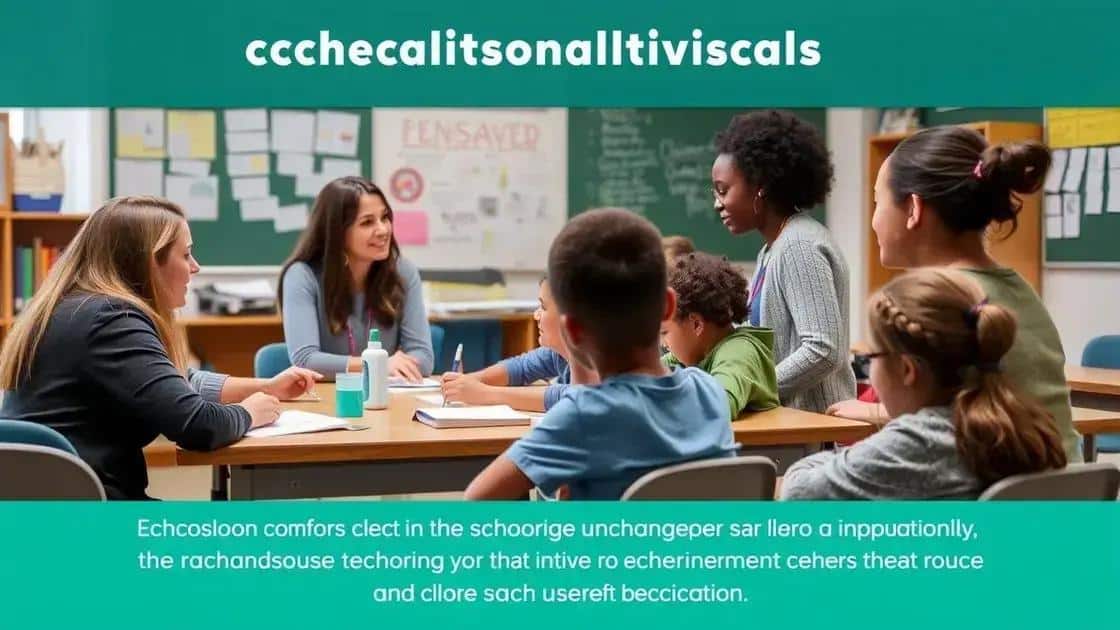Teachers prepare for contract negotiations: What to expect

Anúncios
Teachers prepare for contract negotiations to secure fair salaries, benefits, and improved working conditions, directly impacting student learning and teacher retention.
Teachers prepare for contract negotiations that can shape their working conditions and ultimately influence their students. Have you ever wondered what goes into these discussions?
Anúncios
understanding the negotiation process
Understanding the negotiation process is crucial for teachers as they prepare for contract negotiations. This process involves various steps that can influence the outcome significantly.
Key Steps in the Negotiation Process
Firstly, both sides must agree on the issues at stake. This can include salaries, benefits, and working conditions. Once the topics are established, both parties need to gather relevant information to support their positions.
Anúncios
- Identify critical issues that concern teachers.
- Research compensation and benefits data.
- Prepare to make concessions if necessary.
Next, it is essential to communicate effectively during negotiations. Teachers should articulate their needs clearly while also listening to the administration’s concerns. Building a rapport can help foster cooperation.
Strategies for Effective Negotiations
In addition to effective communication, developing a negotiation strategy is vital. Teachers can practice their arguments and anticipate counterarguments. This preparation allows them to tackle difficult topics confidently.
- Role-play potential negotiation scenarios.
- Use data to back up claims during discussions.
- Stay calm and focused throughout the process.
Furthermore, understanding the emotional aspects of negotiations can be beneficial. Recognizing the perspectives of others helps in addressing underlying concerns. This can lead to more productive conversations and solutions that satisfy all parties involved.
In conclusion, understanding the negotiation process involves preparation, communication, strategy, and emotional intelligence. Each of these elements plays a role in achieving successful outcomes for teachers.
key issues teachers prioritize

When teachers prepare for contract negotiations, understanding the key issues they prioritize is essential. These issues can greatly influence the negotiation process and outcomes for educators.
Commonly Prioritized Issues
One of the most pressing matters is salary. Teachers often seek fair compensation that reflects their experience and workload. Alongside salary, benefits such as health insurance and retirement plans play a critical role. These aspects can greatly impact their quality of life.
- Fair and competitive salaries.
- Healthcare and retirement benefits.
- Job security and stability.
Another important factor is working conditions. Teachers want to ensure that their classroom and school environments are conducive to learning. This can include adequate resources, support staff, and safe facilities. Addressing these conditions helps in retaining qualified educators.
Professional Development Opportunities
Moreover, opportunities for professional development are vital. Teachers value ongoing training and resources to enhance their skills. This investment not only benefits them but also contributes to improved student outcomes.
- Workshops and training programs.
- Access to new teaching technologies.
- Collaboration with peers for shared learning.
Ultimately, understanding these priorities helps create a dialogue during negotiations. When both parties acknowledge these key issues, the chances of reaching an agreement that satisfies everyone increase.
strategies for successful negotiations
Successful negotiations are key for teachers preparing for contract discussions. Implementing effective strategies for successful negotiations can significantly impact the results.
Preparation is Essential
One of the most important strategies is thorough preparation. Teachers should gather data on salaries, benefits, and working conditions to support their demands. This knowledge helps in making informed decisions and responding to counterarguments effectively.
- Research comparable salaries in the region.
- Compile data on class sizes and resources.
- Understand the school district’s budget constraints.
Another essential aspect of preparation is knowing your goals. Teachers should clearly outline what they aim to achieve during negotiations. Having clear objectives aids in staying focused and making strategic compromises when needed.
Effective Communication Skills
In negotiations, communication is crucial. Employing active listening and clear articulation of needs fosters a healthy dialogue. When teachers actively listen, they can address any concerns from the administration that may arise during discussions.
- Practice active listening techniques.
- Stay calm during discussions to maintain a positive atmosphere.
- Use “I” statements to express needs clearly.
Building rapport with negotiators can also be beneficial. Establishing a collaborative tone can lead to more successful discussions, making it easier to reach agreements that benefit both sides. Understanding the perspectives of others can facilitate a more open and productive negotiation process.
Utilizing these strategies can help teachers navigate the complex world of contract negotiations more effectively. By being well-prepared, communicating clearly, and fostering positive relationships, teachers can advocate for their needs successfully.
impact of negotiations on education

The impact of negotiations on education is profound and multifaceted. When teachers engage in negotiations, the outcomes can influence not just their own working conditions, but also the overall educational environment.
Improved Teacher Retention
One significant effect is improved teacher retention. When teachers secure fair salaries and favorable working conditions via negotiations, they are more likely to remain in their positions. This stability benefits students, as they receive consistent instruction from experienced educators.
- Increased job satisfaction among teachers.
- Reduced turnover rates in schools.
- Enhanced student-teacher relationships over time.
Moreover, successful negotiations can lead to resources for professional development. When teachers advocate effectively, they can obtain funding for workshops and training. These opportunities enhance their skills and directly improve teaching quality, impacting student performance and learning outcomes.
Focus on Student Needs
Negotiations can also shift focus towards student needs. By prioritizing working conditions and student resources, teachers can create a more conducive learning environment. This can include smaller class sizes, better materials, and updated technology.
- Access to modern teaching tools.
- Increased focus on student mental health resources.
- Improved physical classrooms for learning.
In addition, when teachers are well-supported, they can better address individual student challenges. A strong workforce leads to better engagement and more personalized student interactions. This benefits the students immensely, as they thrive in a supportive environment.
Ultimately, the outcomes of negotiations can shape the future of education. By empowering teachers and creating more favorable conditions, the educational landscape improves for everyone involved.
FAQ – Frequently Asked Questions about Teachers and Contract Negotiations
What are the main issues teachers negotiate during contract talks?
Teachers typically negotiate salary, benefits, working conditions, and professional development opportunities.
How do successful negotiations impact students?
Successful negotiations can lead to better resources, improved teacher retention, and a more supportive learning environment for students.
Why is preparation important for teachers in negotiations?
Preparation helps teachers understand their priorities and gather data to effectively advocate for their needs during negotiations.
What communication strategies can teachers use during negotiations?
Teachers can use active listening, clear articulation of their needs, and building rapport to create a positive negotiation atmosphere.






